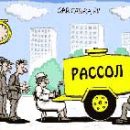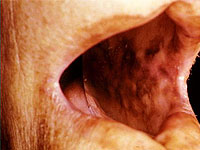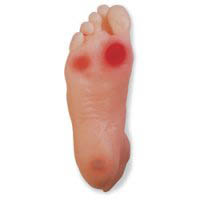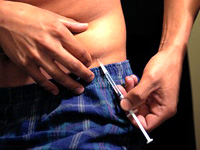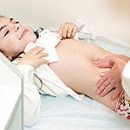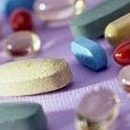Disturbance of carbohydrate exchange, reduction of blood glucose concentration - is hypoglycemia, a diet in this case is a balanced content of proteins, fats, carbohydrates. Hypoglycemia with diabetes mellitus can be a consequence of overdose of received insulin. We are talking about it.
Content
 Endocrinology specialists distinguish physiological hypoglycemia, which is possible in quite healthy people under certain circumstances, and pathological, as a result of disorders in the case of hypoglycemia in diabetes. What are the signs of pathological hypoglycemia? Most often it is:
Endocrinology specialists distinguish physiological hypoglycemia, which is possible in quite healthy people under certain circumstances, and pathological, as a result of disorders in the case of hypoglycemia in diabetes. What are the signs of pathological hypoglycemia? Most often it is:
- Insufficient glucose admission to blood;
- Accelerated glucose removal from the body;
- Combination of several factors.
First of all, from the cause of factors it is worth noting the overdose of the drug insulin in the treatment of diabetes mellitus, as well as excess synthesis of insulin hormone when pancreas hyperfunction. Hormonal changes and insufficient glycogen cleavage, lesion of liver cells, glycogenosis, impaired carbohydrate carbohydrates in the intestine, tumor or critical insufficiency of the organ, for example, kidneys, hearts can also cause hypoglycemia. In addition, this syndrome can be the result of irrational nutrition, burdened by the abuse of refined carbohydrates with a pronounced deficit of fiber, mineral salts and vitamins and occur with insufficient or late meals before serious physical activity, alcohol use.
Clinical picture of hypoglycemia, diet and prevention
When the glucose level responds to the enhanced secretion of insulin hormone and falls below the norm, hypoglycemia develops. Such a condition may occur when the use of certain drugs, for example, aspirin, beta-blockers or psychotropic drugs. There is a disorder of the functions of many organs and tissues, but the brain is especially sensitive to the shortage of sugar, since glucose — This is the main source of energy for braincase. In response to a decrease in blood sugar, adrenal glands allocate adrenaline, due to which the hepatic glycogen begins to be actively recycled in glucose and its level in the blood increases. It is known that long-term hypoglycemia is fraught with irreversible brain damage. Signs of energy starvation of cerebral tissue are manifested by neuroglycoenic symptoms: a violation of memory and coordination of movements, speech, vision, headache, convulsions, loss of consciousness and comatose. To form an accurate diagnosis, it is necessary to urgently measure the level of glucose.
Reactive hypoglycemia is observed with a sharp drop in the level of glucose, which occurs 2-3 hours after meals, manifests itself with a sharp feeling of hunger, dizziness, tremor, heartbeat and due to excess insulin, as an answer to sugar contained in food. Most glucose turns into glycogen, which, if necessary, can become a ready-made source of glucose.
Disturbance of carbohydrate metabolism occurs quite often and is connected with biochemical and pathophysical changes occurring in metabolic processes. General signs of impaired carbohydrate absorption are manifested by diarrhea, bloating, irritability, lag in growth and related to the defect of the enzyme enzyme.
First Ambulance
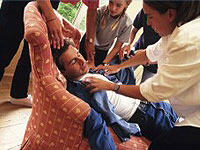 All patients receiving insulin are familiar with the symptoms of hypoglycemia, have at their disposal a glucometer and trained in the methods of glucose levels. Attacks of light and medium-wing of hypoglycemia are independently born with glucose intake, in severe case, urgent introduction of glucose and glucagon injection.
All patients receiving insulin are familiar with the symptoms of hypoglycemia, have at their disposal a glucometer and trained in the methods of glucose levels. Attacks of light and medium-wing of hypoglycemia are independently born with glucose intake, in severe case, urgent introduction of glucose and glucagon injection.
How to prevent hypoglycemia attack, and what rules must be observed? Patients know that besides the glucometer should have to have «Food form kit», Where there are several pieces of sugar, glucose tablets, sweet drink, ampoule glucagon and syringe. The basic rules also applies timely meal with a mandatory amount of carbohydrates. It should be remembered that in front of the physical activity it is recommended to take about 30-50 g of carbohydrates The required number of microelements of the patient should receive from vegetables, fruits, with solid cereals and coarse bread. It is desirable to use legumes, oatmeal and pearl porridge, apples and citrus, avoiding sweets and flour products from high-grade flour.

